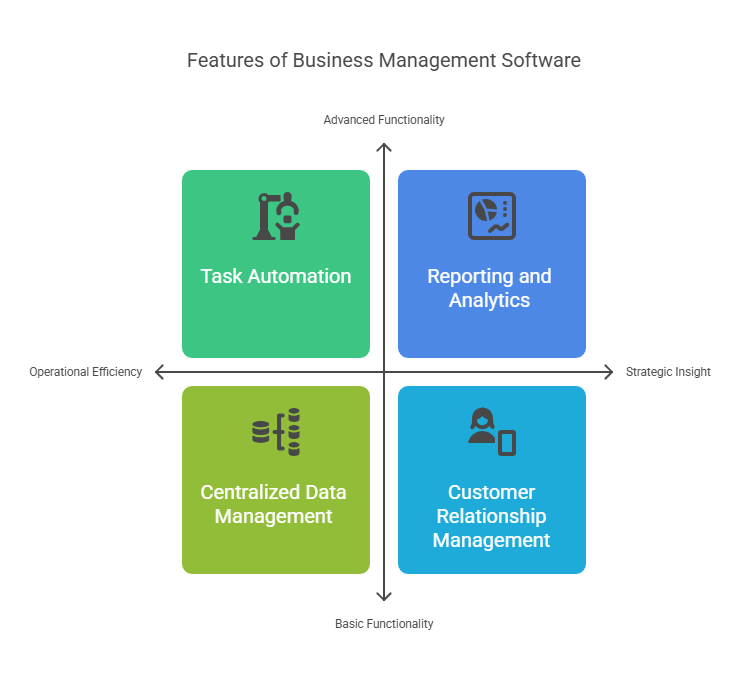BMS is short for Business Management Software, a collection of applications or platforms used to streamline and automate various business processes. This generally enables the management of multiple essential business functions like accounting, human resources, inventory management, customer relationship management, or even project management in just one integrated solution. These software systems are applied to increase operational efficiency and hence improve productivity with data-driven decision making across different departments of an organization.
Today, BMS usage has grown multifold in organizations - from small ventures to big corporations. Businesses are equipped with a centralized database and automatization of routine operations, as well as enterprise-analytical capabilities that enable business activities to be performed more precisely and accurately. BMS flexibility can be attuned to the specific needs of an industry; hence, adaptable solutions are available for various industries- retail, manufacturing, healthcare, finance, and many more.
Characteristics of Business Management Software
Functionalities normally contained within Business Management Software will be diverse end functionalities that cater to broad organizational needs. Thus, some features found within it include the following-
1. Task Automation: Routine processes such as payroll management, invoicing, order fulfillment, and inventory tracking are automated and not relied upon for manual intervention to avoid maximum error entry and time consumption.
2. Centralized Data Management: A single platform facilitates data storage and access from different departments to simplify data sharing, collaboration, and have a harmonized view of the performance of the business.
3. Enterprise Resource Planning (ERP): ERP tools often part of BMS, provide the ability to manage every kind of resource such as financial resources, inventory, and human capital effectively, using them optimally.
4. Customer Relationship Management (CRM): The usage of CRM tools and their implementation into BMS shows how a business can manage and track the interactions related to the customer, automate marketing processes, and nurture client relationships
5. Project and Workflow Management: A tracking system in real-time for projects and tasks ensures that the given objectives are achieved efficiently by tracking progress and proper management of deadlines.
6. Reporting and Analytics: Real-time detailed reports along with analytics are created here that give important information regarding a company's sales performance, financial data, and many more operational metrics. Such input is very useful for business leaders who can make information-based decisions very easily.
image
Role of a Software Company in Developing Business Management Software
Since Business Management Software development and implementation involve technical functionalities, companies engaged in software production are needed. Among all roles, creating, deploying, and maintaining a BMS system needs the involvement of a software development company at its most crucial level.
Developing Solutions on Custom Basis
Software houses need to develop customized BMS systems based on the specific needs of an organization. By studying every detail of a company's workflow and its operational needs, the developers of such software are capable enough to build systems capable of handling a singular challenge. The customization ensures that the software fits in with existing infrastructure but offers much flexibility as the business scales up.
Integration with Existing Systems
Software houses, therefore are involved in the integration of new Business Management Software with the organization's old systems and applications. This might include integration with all legacy systems, such as CRM, accounting software, etc. The criteria are no disruption of the flow of data but must be compatible with workflows at present.
Data Security
Given the fact that the data dealt with by BMS is sensitive, the software companies will be taking up stringent security measures. Data will be encrypted, and proper access protocols and periodical updates shall be carried out to safeguard the system against real and potential security risks and breaches. Therefore, the task of safeguarding business-critical data lies with the software company.
Ongoing Maintenance and Support
The software companies' technical team will provide continuity support after the Business Management Software has been installed, in the form of ensuring that the system runs seamlessly. Regular system maintenance will be performed, there will be troubleshooting services for the problems that would arise, and every issue will be solved. This ensures that the software is operational, and up-to-date, and will continue to scale as the business evolves.
Training and User Onboarding
In a better use of the BMS, software companies offer training and onboarding programs to the users. Employees are trained in all the features and functionalities so that they can operate the system in an effective and seamless way. There is then less resistance to new technology, and employees get into a rhythm faster with new tools they are productive right off the bat.
Cloud-Based Solutions
There is growing demand from businesses for cloud-based BMS solutions offered by software companies. Cloud systems enable business users to access data and software from any location around the world that possesses a network connection. This solution allows flexibility, reduces costs of infrastructure, and enables companies to scale on their required limits. Software companies develop cloud-based solutions allowing for seamless access along with security and reliability.
Business management software has become an indispensable tool for organizations in their pursuit of better operations, process automation, and data-driven decisions. Behind that stands the role performed by software companies that develop, implement, and maintain the system. From custom development to system integration, implementing security, and even support, businesses are made possible to leverage Business Management Software at its full potential. As such, the BMS will become a lot more integral in achieving operational efficiency as businesses go with the times and better themselves.